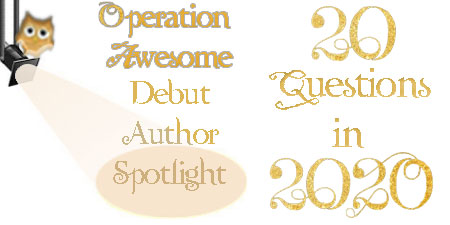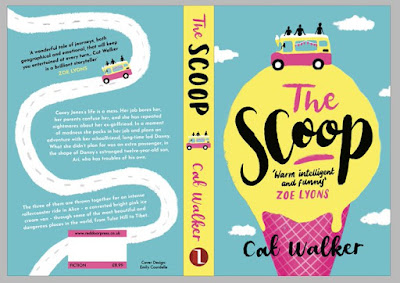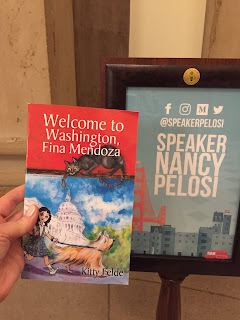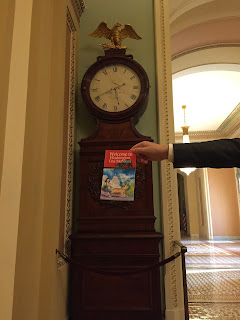
Pivot by L. C. Barlow
1- You have a dark horror speculative fiction novel but, given the title, how often do people ask you if "Pivot" is a reference to Ross from the show Friends moving a couch?
Hahaha! I love this question! I have so many people reference that Ross/pivot scene all the time. Whenever I was advertising the book on
@
CreepyCabin
’s and
@
HomeSweetHell
’s Instagram accounts, one of the comments would regularly be, “I can’t help but think of Ross from Friends.”
I’ll add that I’m a huge Friends fan (I grew up with the show), and I’ll leave it on late at night while I’m grading papers. The name of the book has nothing to do with the show; however, for a Christmas gift, my best friend gave me a dark blue sweatshirt with “Pivot. PIVOT! PIVAAAHHT!” written in the lettering from Friends. This was the first Christmas after Pivot had been published, and it was just such a perfect gift.
2- Would you please, in 160 characters or less, give a #WriteTip ?You do not need to insert figurative items into your story to feel better or “redeem it.” Trust the reader to follow you. Otherwise, you make more work for yourself when revising.
3- What is the best piece of writing advice you've received?I’ll provide three pieces of advice that were all equally important.
You can only enter a room for the first time once. That’s why it’s important that you get your work to as optimum of a level as possible before submitting it to an agent or editor. Once they “enter the room” (read your work) for the first time, they can’t see it nearly as objectively after. Your own objectiveness is compromised because you’ve been with the work for so long. That’s why you need workshoppers you can trust (and who know how to get you to emphasize things and back off things without being cruel or mean).
Keep in mind the Hemingway Theory – that 10% of the story is what the author lets the audience see, and 90% is hidden. It’s very much like a glacier – the top 10% is visible, and the bottom 90% is below water. The amount of work you put into a novel is the 90%. When I wrote Pivot, I wrote about five times the amount that the book ended up being. The book is around 280 pages. I definitely wrote over 1,000 pages while constructing it.
Read Save the Cat! by Blake Snyder and The Writer’s Journey by Christopher Vogler. These were books that Nancy Holder (a prolific author and one of my professors) recommended to all of her students in my MFA program. Both books have beat sheets in terms of how a story should move. When I read them, I was so incredibly impressed. Before my MFA, I had written my first novel without any plot guidance. I retroactively compared it with Snyder’s 15-point beat sheet. To my surprise, I found that 13/15 elements in my manuscript aligned. That was the Aha! moment of, “Oh, this is why it worked. I know what I did, so now I know what to do.” I regularly return to these books and always learn something new.
4- Pivot is a Readers’ Favorite book award finalist in the horror genre. How did you find out about the Readers’ Favorite book award?
I am going to give you the long answer to this.
When I originally wrote Pivot, I self-published it without querying any agents because I had always been given the impression that getting published traditionally was impossible. When I self-published the novel, I received quite a bit of interest with, what turned out to be, over 65,000 downloads of the book (I made the book perma-free on Amazon and purchased two BookBub ads for it). In the midst of getting these downloads, I was reading people’s reviews, and quite a few of them complained about the cover. Thus, I scouted for book cover designers and settled on Bookfly Design. James T. Egan created a gorgeous cover for the self-published version of Pivot, and I do believe that is one of the things that greatly helped me receive so many downloads. One of the things that Kira Rubenthaler at Bookfly Design recommended to me was submitting my book to Indie book awards – which I did not know existed – and I did what she suggested. Ultimately, Pivot was a finalist for the Next Generation Indie Awards in eBook Fiction, a Winner of the Indie Reader Discovery Awards in Horror, and a Winner of the eLit Awards in Horror. Pivot made IndieReader's Best Books of 2014. Additionally, though, Pivot was one of the first self-published horror novels to be on the preliminary ballot for the Bram Stoker Awards.
Pivot did not make the final ballot for the Stokers, so it was not technically a nominee, but I read up on the Horror Writers Association and became intrigued. I went to the World Horror Convention in Portland, Oregon in 2014, where I met a wide array of authors and, fortuitously, an entertainment lawyer who was interested in my book. That eventually led to my getting an agent and then, ultimately, a publisher.
As a result, I knew how important it was to submit a book to award competitions, and upon the traditional publication of the revised Pivot, I made sure to Google awards to submit the book to. Fortunately, there is an even wider array of awards for traditionally published books (albeit, these are potentially more competitive). The
Readers’ Favorite Book award intrigued me because it is a level playing field for both Indie authors and traditionally published authors. Anyone can enter.
5- Would you share a picture with us of your book with Smaug and Dusty?Of course!
 6- What's the best part of living in Dallas, Texas?
6- What's the best part of living in Dallas, Texas?My favorite parts about living in Dallas are the following: I regularly visit the Bishop Arts District in Oak Cliff, which is a fantastic little arts area that a friend actually compared to New Orleans (and I can sort of see why). In the BA District, there’s the Wild Detectives coffeehouse/bookstore/bar, a delicious pie place called Emporium Pies that a younger woman (who is such an inspiration) built from the ground up until it exploded in popularity, a jazz club, a sushi place, live music every weekend, Dude Sweet Chocolate where you can get “chocolate salami” and “R2D2 marshmallows” among other things, a comic book store, a Batgirl mural, a pizza place called Eno’s that feels like a Denver, Colorado cabin inside, etc.
Dallas also has a fantastic art museum – the Dallas Museum of Art – that houses Yayoi Kusama’s “All the Eternal Love I Have for Pumpkins,” among other amazing pieces.
Finally, as Dallas is mainly known for shopping and dining, I want to mention Rise No. 1 as one of the best restaurants to visit. Whiskey Cake, Baboush, and Cloud Nine at Reunion Tower are also worth visiting.
7- What's your Twitter handle, and do you have two or three writer friends on there to shout-out to for #WriterWednesday ?My Twitter handle is
@LCBarlowAuthor
. I’d love to give a shout out to
@JoshMalerman
,
@nancyholder
, and
@westonochse
.
8- Do you have a favorite #bookstagram image or account/ profile?My favorite #bookstagram account profile is probably @
foldedpagesdistillery or
@
bookbento
. Both accounts make absolutely gorgeous photographs to advertise books, and I love drinking them in.
9- What most motivates you to read a new book?Book recommendations from friends really motivate me to read a new book. In addition, I’m very motivated to read books by my friends and/or professors. Often times, if I’ve read a book by an author and loved it, I will search for more books by the same author to sort of chase the high. Lastly, if there’s a book out there in the same vein as a book I’m writing (same genre, similar idea, etc.), I will often check it out.
10- It's our tenth anniversary! How far has your writing come in the past ten years and where do you see your writing career ten years from now?Congratulations on your tenth anniversary!
In the past ten years, my writing has made much amazing headway. My first professionally published fiction piece was in 2008, and it was flash fiction in a journal that no longer exists (Oak Bend Review). In 2011, I had an academic article published in the peer-reviewed Popular Culture Review. In 2013, I self-published Pivot, which ultimately received over 65,000 downloads and multiple awards. At the World Horror Con, I met individuals who were willing to help me revise my work and query agents. I was fortunate to find a wonderful agent in and around 2016 and land a book deal with California Coldblood Books by 2018. I signed a contract with Brilliance audio in 2018, as well, and Emma Galvin – the amazing voice actor who voiced Winter’s Bone and the Divergent Series – voiced Pivot. This blew me away. Both Josh Malerman and Weston Ochse wrote wonderful blurbs for the book. So, too, did Publishers Weekly and ALA Booklist. Finally, I received my MA in 2013 and MFA in 2019.
11- What is your favorite book by someone else, what's the author's Twitter handle, and what do you love most about that book? #FridayReads book recommendation time!
Author name: Anne Rice
@AnneRiceAuthor
Title: Blackwood Farm
Love because: It is atmospheric, gripping, intense, and beautiful. It is my favorite of the Anne Rice novels, and Tarquin Blackwood is probably as equally my favorite as Lestat.
12- What emotions do you hope your book will evoke for the reader? I hope to combine/convey beauty, horror, and intelligence to leave the reader in awe. I suppose awe is the emotion I’m after. When I was writing the book, though, the process very much reminded me of the grinding of a mortar and pestle. So, perhaps gravitas should be added to that mixture.
13- What kind of impact do you hope your book will have?I hope the book gives readers what they didn’t know they wanted. A very kind reviewer said that in his review of Pivot, and it meant a lot to me.
14- What is the best writing tool, program, or reference book you've ever bought?
One
set of reference books I highly recommend are Angela Ackerman and Becca Puglish’s The Emotion Thesaurus: A Writer’s Guide to Character Expression, The Urban Setting Thesaurus: A Writer’s Guide to City Spaces, and The Rural Setting Thesaurus: A Writer’s Guide to Personal and Natural Places.
Below is a craft book recommendation (two craft books, actually) and the story of why I recommend them.
Pivot was originally self-published, and when I wrote the novel, I didn’t really know anything about writing. I wrote the chapters alternating between past and present, with two plot lines that complemented one another. When I finally met up with several people who were willing to help me produce a more professional, publishable version of the novel, they helped me to significantly change, enhance, and build those different plotlines. When an agent took on the novel, he wanted me to separate the book into two books. At first, I declined, but as time went on, I realized that the book needed to be separated into two, that my agent was right, and I did so, taking the time to build the first one up and knowing the second one would be the second of the trilogy and that it needed to be built up like the first one.
The thing, though, was that I had really kind of built that first book through trial-and-error. I had written over 1,000 single-spaced pages to produce a 250-page single-spaced novel, and even though I had managed to make it work, I wasn’t exactly sure how.
At this time, I had started an MFA program because I had anticipated this problem. Nancy Holder—an amazing writer, woman, author, person in general—was my professor for two semesters and two residencies, and she told her classes about two books that she uses to help plot books: Blake Snyder’s Save the Cat! and Christopher Vogler’s The Writer’s Journey. I immediately purchased these books and read them. Subsequently, I compared Pivot to see how much its plot points lined up with the 15-point beat sheet in Save the Cat! As it turned out, 13 out of 15 points lined up. Thus, I was able to see how I had made the book work and move onward to the next novel. I used the same beat sheet to help finish the second of the trilogy, and I, like Nancy, will most likely use the two beat sheets from these books for every novel in the future. Writing requires so much problem solving, and these books improve my ability to address those problems before seeking outside help. They help me produce things that I didn’t know I could produce, and I learn something new every time I read them.
That being said, after learning how to more effectively plot, I also learned that plotting isn’t everything. There’s just something about letting the novel develop organically that is so important. Really, if you sit down and say exactly what you wanted to say when writing, you’ve kind of failed. It’s only by writing something beyond what you knew to write that you have succeeded – when you write more than you thought you knew. So, when I do pre-emptively plot with the above books as my guides, I do so while taking it with a grain of salt, and often times the plot shifts dramatically three or four times as I go back and revise.
15- In what ways are the main characters in your book diverse? diversebooks.org #WeNeedDiverseBooks The Pivot-verse has a major character that is a person of color. Roland James is essentially the second (better, kinder, essential) father figure to the protagonist as she progresses through the novel. He is the angel to Cyrus’s devil, as his heart turns for the better a quarter of the way through the book. He is simply trapped with Cyrus like everyone else is, as Cyrus has a red box that can kill individuals as soon as they take the first step to leave or turn against him. I don’t want to give too much away, but Roland and Jack work together to become better individuals and attempt to escape.
16- Who is your favorite book review blogger?I’m a big fan of Tim Waggoner’s blog, Writing in the Dark, and Weston Ochse’s blog, Living Dangerously. In terms of a book reviewer, I enjoy Marvin P. Vernon’s book reviews; however, he does not have a blog.
17- What was the deciding factor in your publication route?I have taken part in both self-publishing and traditional publishing, and there are really advantages and disadvantages to both. In fact, I dedicated my final MFA project to interviewing successful self-publishers (Andy Weir, Michael Sullivan, David Chilton, Christopher Paolini, and others) and creating a presentation to help educate fellow students on those advantages and disadvantages. You can access my presentation, if you would like, at this link:
lcbarlow.org
As of right now, it’s really difficult for me to state which route is best for me, and it is possible that in the future I, like many other authors, will have a career that is an amalgam of both traditional and self-publishing. I will just have to see.
18- Which author, past or present, do you feel most resembles your work?This is tough. If I were forced to gauge my work in terms of other authors, I might say that it’s a combination of Anne Rice, Poppy Z. Brite, Chuck Pahlaniuk, and maybe Stephen King. At the same time, I am highly aware those authors blow me out of the water.
19- Would you please ask our audience a question to answer in the comments?What is your favorite genre and why? Alternatively, what makes you lean into a novel? What makes you lean out?
20- Anything else you would care to share about your book and yourself?
“Impressive and arresting prose drives this vivid debut. (…) Barlow’s gorgeous writing will easily propel readers through the rest of the series.”
—Publishers Weekly
“Beyond good and evil, Pivot juggles archetypes until you’re not sure which ball is airborne and which is still in the author’s hand. A story about cracking free of your intended role in life, as plot and depth travel at the same exceptional speed.”
—Josh Malerman, NYT Bestselling Author of Bird Box
“Pivot is perhaps one of the best first novels I have ever read. Tight. Clean. Imaginative. It’s rare for a first-time author to create a homicidal protagonist who you want to follow. I’m eager to read more of these characters, because in Pivot, Barlow creates a universe of cruel.”
—Weston Ochse, Award Winning Author of Burning Sky
“A brilliant blend of mystery and horror. (…) Pivot is well plotted and the author introduces twists that readers won’t see coming. L.C. Barlow takes readers on a perilous journey, crafting scenes that are emotionally charged and focused and creating characters that are both complex and real.”
—Readers’ Favorite Book reviews (Five Stars)
Amazon Link:
https://amazon.com/Pivot-L-C-Barlow/dp/1644280531/
Audible Link:
https://audible.com/author/LC-Barlow/B00CRQLPCM
Target Link:
https://target.com/p/pivot-by-l-c-barlow-paperback/-/A-78647662?
Barnes&Noble Link:
https://barnesandnoble.com/w/pivot-lc-barlow/1117443925?
Walmart Link:
https://walmart.com/ip/Pivot/643118435?
Publishers Weekly Review:
https://publishersweekly.com/9781644280539?fbclid=IwAR2ZFKxU736DG2SD5Hyl4aRo_Ph5qvMjZEHUdJ7bkH6OA6okUgG19jqygZE
Readers' Favorite Review:
https://readersfavorite.com/book-review/pivot
Book Trailer:
https://youtube.com/watch?v=utwJ0g6cvLo
Author Website:
https://lcbarlow.org
Twitter Link:
@LCBarlowAuthor
Instagram Link:
https://instagram.com/lcbarlowauthor/
Pivot by L. C. Barlow




















